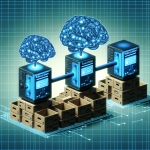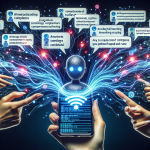Introduction: The Rise of AI in B2B Marketing
In recent years, Artificial Intelligence (AI) has transformed many industries, with B2B marketing standing out as a particularly fertile ground for innovation. Unlike B2C marketing, which relies heavily on mass communication, B2B efforts often hinge on targeting a smaller set of high-value prospects. Here, AI is proving invaluable in enhancing precision, personalization, and performance.
The Evolution of Account-Based Marketing (ABM)
Account-Based Marketing (ABM) has long been a cornerstone of B2B strategy, focusing marketing efforts on specific organizations rather than broad demographics. Traditionally, ABM relied on manual research and anecdotal insights. Today, AI enables marketers to identify, segment, and engage target accounts in highly personalized and automated ways.
From Generic Campaigns to Intelligent Segmentation
AI algorithms process vast amounts of structured and unstructured data to segment target lists more effectively. Using predictive analytics and machine learning, marketers can identify which accounts are most likely to convert based on firmographics, behavior patterns, engagement history, and more. This granular segmentation ensures that resources are directed toward the most promising leads.
AI-Powered Intent Data: Understanding Buyer Behavior
One of the most significant developments in B2B marketing is the use of AI-powered intent data. Through natural language processing (NLP) and machine learning, AI can analyze digital footprints—such as search behavior, content downloads, and website visits—to determine buying intent.
Identifying Purchase Signals
AI systems can detect subtle patterns that indicate a company may soon be in the market for specific solutions. This allows sales and marketing teams to engage with the right accounts at the right time, providing relevant content and solutions before the competition.
Hyper-Personalization at Scale
Another way AI is revolutionizing B2B marketing is by enabling hyper-personalized experiences. Traditional methods made it nearly impossible to tailor messaging to hundreds or thousands of prospects. AI changes this by dynamically creating custom campaigns based on data points pulled from CRM systems, social media, third-party databases, and more.
Dynamic Content Delivery
Machine learning models help identify what type of messaging resonates with different decision-makers within an organization. By analyzing previous interactions, AI can predict which format (e.g., email, whitepaper, webinar) and topics are most likely to engage a particular account. This ensures that every touchpoint is relevant and impactful.
Improving ROI Through Predictive Analytics
AI helps B2B marketers allocate their budgets more intelligently. Predictive analytics uses historical data to forecast future performance of marketing campaigns. This level of insight allows teams to double down on strategies that work and pivot away from underperformers faster than ever before.
Optimizing the Sales Funnel
AI not only helps attract the right accounts but also supports their progression through the sales funnel. Through lead scoring models, AI ranks leads based on the likelihood to convert, helping sales reps prioritize their outreach for maximum return on investment.
Challenges and Considerations
While AI offers tremendous value, it is not without challenges. Data privacy, model transparency, and integration with existing MarTech stacks can pose hurdles. Moreover, over-reliance on AI can depersonalize interactions if not managed carefully.
The Future of AI in B2B Marketing
As technologies like generative AI, conversational intelligence, and real-time data analytics continue to mature, the possibilities for AI-driven B2B marketing will expand. Future applications may include automated proposal generation, intelligent bid management, and even AI-driven contract negotiations.
Conclusion
AI is no longer a futuristic concept in B2B marketing—it’s a present-day necessity. From identifying high-value accounts to delivering personalized content and improving ROI, AI allows marketers to target with a level of precision that was previously unimaginable. As adoption continues to grow, companies that leverage AI effectively in their ABM strategies will gain a significant edge in an increasingly competitive landscape.





